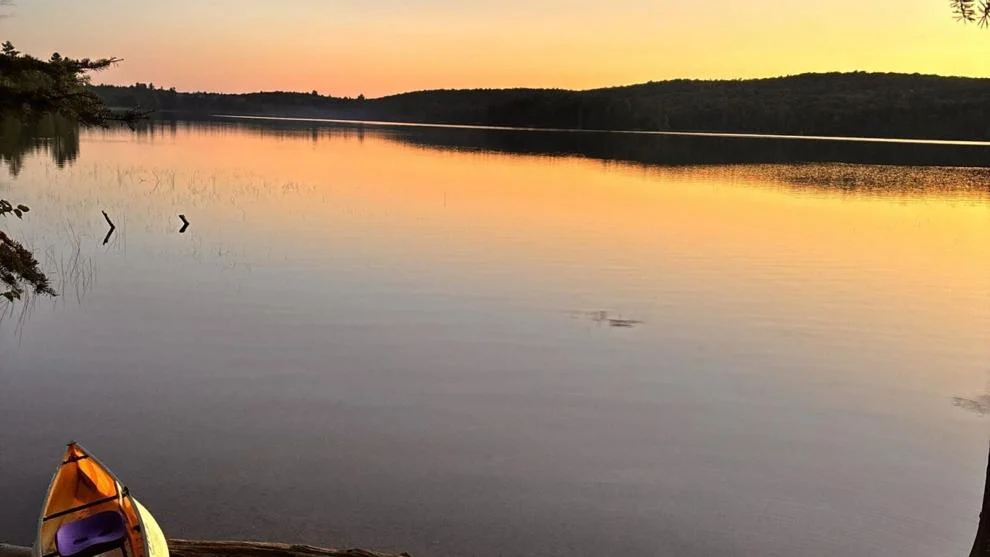How nature generates passive income in Muskoka and beyond
By Jared Jylhä | November 15, 2025

When we hear the word infrastructure, we picture what humans have built. We think of roads, bridges, dams, and drainage systems — the concrete and steel that keep our towns connected and our lives moving.
But there’s another kind of infrastructure we depend on. One that doesn’t appear in a municipal budget or a construction schedule. It’s the original network of systems built over hundreds of millions of years: nature’s infrastructure. And like a great investment portfolio, it’s diversified, helps us avoid future expenses, and quietly pays dividends. In other words, nature provides passive savings and passive income for our communities.
As a marketer, I’ve always believed in the power of analogy. A good metaphor turns abstract concepts into something you can feel. And when I think about how nature operates, I see the oldest business model there is, quietly compounding returns for millennia.
Let’s start with the savings side of the ledger. A wetland doesn’t charge us for flood protection, a forest doesn’t bill us for carbon capture, and a pollinator doesn’t invoice for its labour, yet one in every three bites of food we eat depends on it.
If we saw these systems as assets, we’d protect them like we protect our investments. Because when wetlands are drained or forests are cleared, we don’t just lose beauty; we lose function. That’s like selling the brakes off your car to buy shiny chrome rims. The rims might look good, but they won’t help prevent a crash.
Everyone understands the importance of brakes, even if they don’t know exactly how the system works. The same should be true for ecosystems. We don’t need everyone to grasp every ecological detail. We just need people to see why natural spaces are critical to our safety, economy, and well-being.
And thanks to the University of Waterloo, we have numbers that put this into a business perspective. Its research found that keeping wetlands intact can reduce flood damage costs by up to 38 per cent in urban areas and nearly 30 per cent in rural ones. In southern Ontario alone, wetlands provide an estimated 4.2 billion dollars’ worth of water filtration and sediment control every year. That’s work that would otherwise require expensive engineered systems.
But nature doesn’t just save us money. It also pays us back in ways we can feel. Spending time in nature lowers stress, improves focus, and even extends life expectancy. Researchers at Harvard found that people who spend at least two hours a week outdoors report significantly higher levels of physical and mental well-being. In that sense, nature provides passive income for the mind, body, and spirit. It nourishes us emotionally, physically, and spiritually — compounding returns we often take for granted.
Maybe the conversation about conservation isn’t about saving nature. Maybe it’s about recognizing nature as an investment that’s been quietly paying dividends for human survival all along.
Let’s tell nature’s story through analogies and metaphors because it’s a story of constant evolution and quiet generosity. Over millions of years, nature has learned how to provide all life on earth with passive savings by softening the planet’s power and preventing damage to our homes and communities. It also provides passive income in the form of peace, health, and wonder. One side of the ledger secures our future; the other nourishes our well-being.
It’s time to update our definition of infrastructure to include the living systems that support our progress and keep our collective balance sheet in the black. And the best part? Nature doesn’t need a stimulus package. It just needs respect and the space to do what it does best.
Our job is simple: don’t interrupt the income stream, and don’t spend the savings.

This article is No. 22 in the current series from Muskoka Watershed Council on Living Smarter in Muskoka. The author is Jared Jylhä CM, a collaborator with the MWC. With deep roots in Muskoka, Jylhä, brings a lifelong connection to Ontario’s natural landscapes and a passion for community engagement in his career as senior account director at Well Known Marketing.
First published by MuskokaRegion.com
